Lunedì 12 giugno 2017 si è tenuto l’evento: “VISITE AI CAMPI SPERIMENTALI DI BIO2”.
In mattinata sono stati visitati i campi sperimentali dell’Azienda Agricola Bismantova (Castelnovo Monti, RE).
Silvia Folloni (Open Fields) ha introdotto l’evento descrivendo background, obiettivi e azioni chiave del Piano di Innovazione e GOI Bio2.
È seguito un saluto da parte della Senatrice Leana Pignedoli, Vicepresidente della Commissione Agricoltura in Senato, che ha sottolineato l’importanza della produzione e del consumo di prodotti biologici, definiti come “un bene per l’ambiente, la salute e l’economia delle zone montane”.
Il Professor Salvatore Ceccarelli, dopo aver raccontato dell’origine dei miscugli e aver ripercorso le tappe salienti del suo lavoro in Siria, ha comunicato la recente approvazione da parte della Commissione Europea della commercializzazione del seme del miscuglio ICARDA e di altri miscugli.
Una decisione che Silvio Grassi, Amministratore delegato del Molino Grassi, ha definito come una prima fessura in quello che è il muro della rigida legislazione moderna sulle varietà storiche di frumento.
L’Assessore Regionale all’Agricoltura, Caccia e Pesca, Simona Caselli, ha infine ribadito l’importanza di una diffusione efficace delle informazioni derivanti dal progetto e, in generale, sul mondo del biologico, affinché si possa raggiungere il massimo impatto sulla cittadinanza, con l’obiettivo di aumentare la consapevolezza dei risultati ottenuti.
Al termine degli interventi, Cristina Piazza (Azienda Agraria Sperimentale Stuard) ha illustrato, presso i campi sperimentali dell’Azienda, le specie e le varietà storiche del genere Triticum seminate in purezza e miscuglio, descrivendo per ciascuna le caratteristiche genotipiche, fenotipiche e colturali.
Nel pomeriggio il gruppo si è trasferito ai campi dell’Azienda Agricola Angus (Compiano, PR), dove Roberto Reggiani, agronomo della Stuard, ci ha illustrato le specie e le varietà seminate in parcelline e parcelloni.
Ciascuno dei due appuntamenti si è concluso con una degustazione di prodotti biologici e ottenuti da cereali “biodiversi”, coltivati dagli agricoltori partner di Bio2.
E’ possibile scaricare le slide presentate da Silvia Folloni presso l’Azienda Agricola Bismantova ed il materiale distribuito a tutti i presenti: il volantino dell’evento, la scheda del Piano di Innovazione, la scheda descrittiva del progetto e gli schemi di campagna.
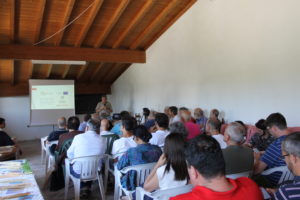
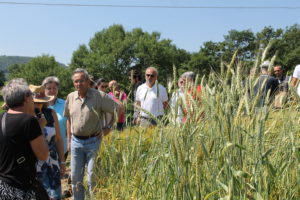
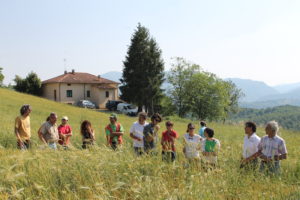
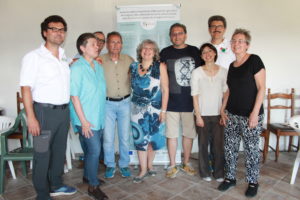
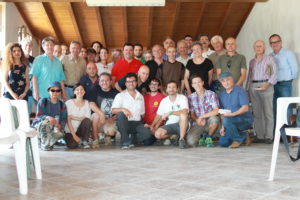
On Monday June 12th the experimental fields of the Innovation Project BIO2 have been shown to all interested people.
In the morning, a rather large group of interested participants, with different professional orientation (from institutional representatives to farmers, from university teachers to agronomy students) visited the Bismantova Farm (Castelnovo Monti, RE).
Silvia Folloni (Open Fields) introduced the event describing the BIO2 mission, objectives and strategies.
Senator Leana Pignedoli, Vice-President of the Agriculture Commission, underlined the importance of the production and consumption of organic products, because of their great impact on environment, health and economy.
Prof. Salvatore Ceccarelli, after explaining the origin of seed mixes and the highlights of his work in Syria, reported on the recent authorization by the European Commission of the selling of the ICARDA seed and other mixtures. A decision that has been defined by Silvio Grassi, CEO of Molino Grassi, as a first slit in the wall of historical wheat varieties legislation.
Lastly, the Regional Minister for Agriculture, Hunting and Fishing Simona Caselli, further underlined the importance of disseminating the results which will be gained with Bio2 project, and on organic agriculture in general, in order to increase the awareness of organic and “biodiverse” products.
Afterwards, Cristina Piazza, agronomist of the Azienda Agraria Sperimentale Stuard, guided visitors through the experimental fields describing the Triticum ancient species and historical varieties sown in purity and mixes.
In the afternoon, there followed the visit to the experimental fields at Angus Farm (Compiano, PR) under the guidance of the Stuard agronomist Roberto Reggiani.
Each meeting ended with a tasting of organic and “biodiverse” products offered by Bio2 partners.
You can find the presentation shown at the event and other informative leaflets: the flyer of the event, the Innovation Plan, the project description and the field trials layout (in Italian only).


So, what do you think ?